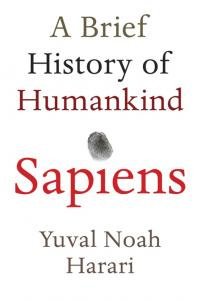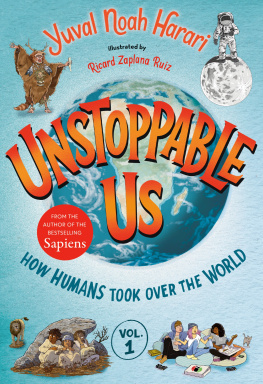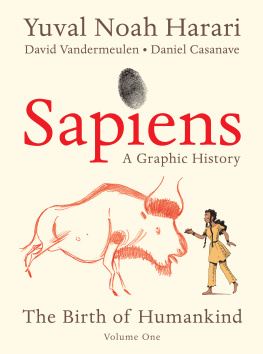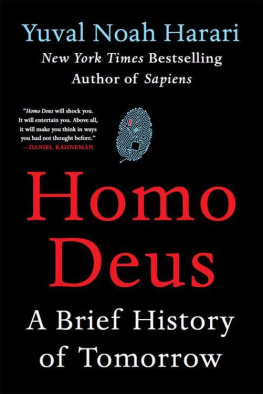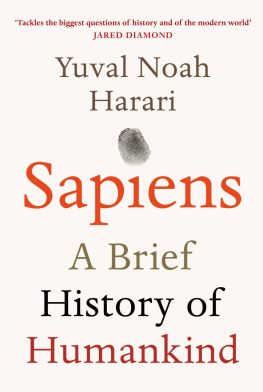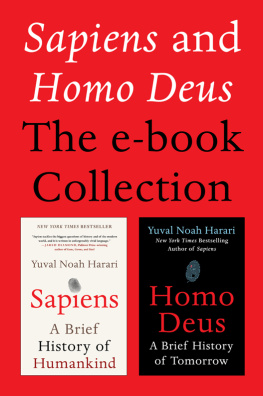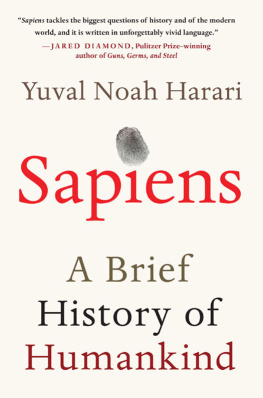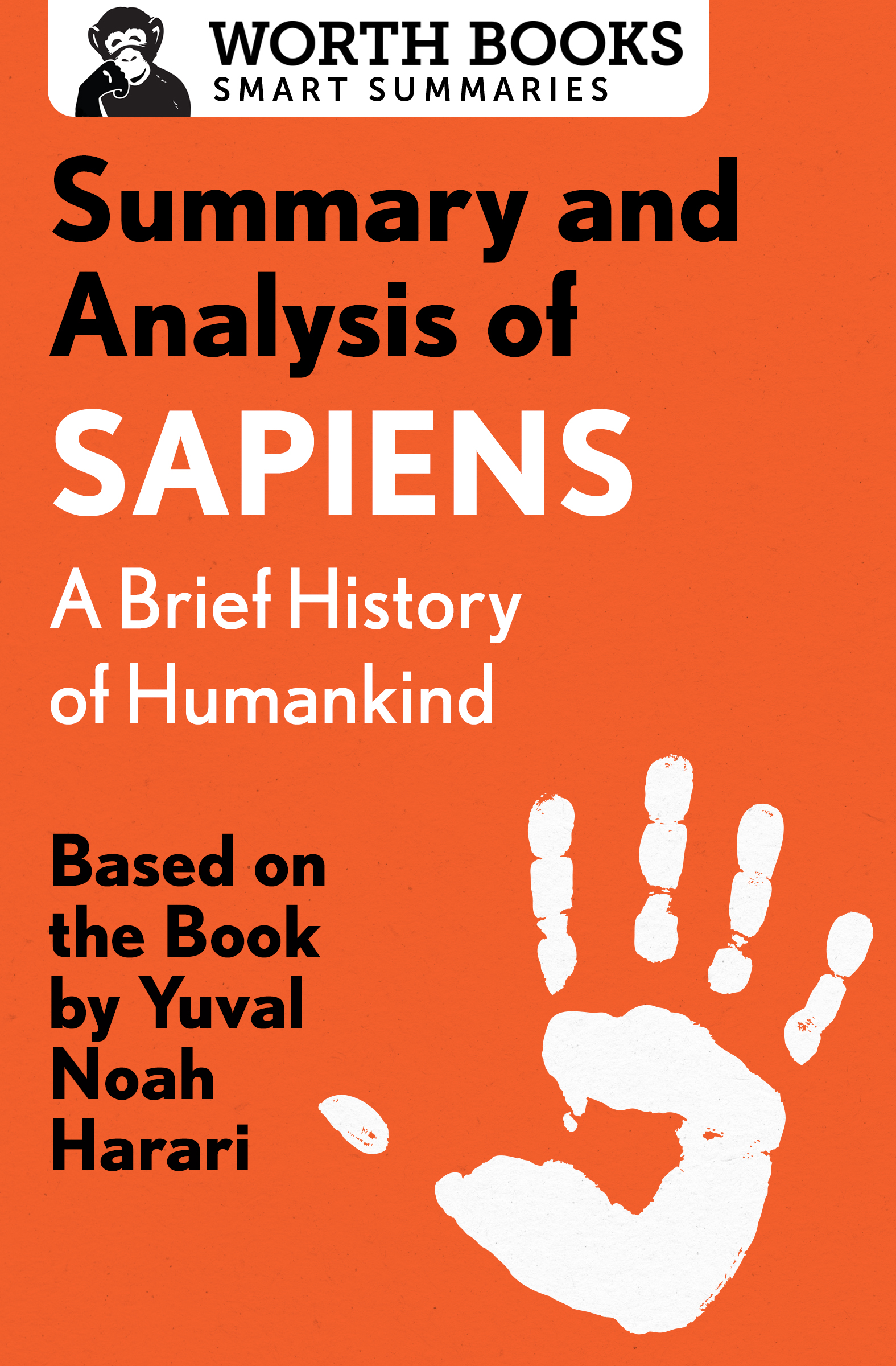Summary and Analysis of
Sapiens
A Brief History of Humankind
Based on the Book by Yuval Noah Harari

Contents
Context
Sapiens: A Brief History of Humankind by Yuval Noah Harari belongs to a nonfiction category known as Big History, which examines humanity from its origins to the present. Authors such as David Christian ( Maps of Time ) and Jared Diamond ( Guns, Germs, and Steel ) have published bestsellers with a similar scope. Sapiens stands apart, not for the breadth of its subject, but for the originality of its approach. Yuval Noah Harari turns the conventional wisdom about our species on its head with novel ideas about the spread of humankind, its effect on the planet, and the importance of language and imagination in human history.
The book originated from a course taught by Harari, a professor of history at the University of Jerusalem. Originally published in Hebrew in 2011, Sapiens has since become an international bestseller, having been translated into 26 languages; it also spawned an online course that has been audited by some 100,000 people around the world, and an exhibition at the Israel Museum in Jerusalem.
Overview
Sapiens: A Brief History of Humankind presents a sweeping account of human history, along with startling theories about why our relatively weak and insignificant species has managed to dominate all others and, more importantly, where it is headed now.
Author and professor Yuval Noah Harari recounts the story of humankind, from its inauspicious beginnings in East Africa 150,000 years ago to the conquest of outer space and understanding of genetics today. This epic story is divided into broad areas of study whose titles may ring familiar: the Cognitive Revolution, the Agricultural Revolution, and the Scientific Revolution. But just as he dismisses the conventional view of Homo sapiens as an innately superior being, Harari challenges our notions about the major changes that allowed humanity to survive and thrive.
In the Cognitive Revolution, 70,000 years ago, humans acquired language, and with it, the aptitude to name the objects that surrounded them. Much more useful was the ability to name things that didnt exist, such as spirits and deitiesthe shared myths that empowered humans to mobilize on a large scale.
The migration of Sapiens from East Africa to the other continents led to the extinction of its contemporaries, notably the Neanderthals. The insatiable and efficient human hunters also eliminated much of the worlds megafauna, earning for itself the dubious distinction of being the deadliest species in the annals of biology.
Nature exacted its revenge about 10,000 years ago, when the nomadic hunter-gatherers turned to farming. The Agricultural Revolution, far from a watershed in human progress, was historys biggest fraud. These agile foragers had lived dangerously but enjoyed lots of leisure time, a varied diet, and freedom from many diseases. They exchanged all that for a stationary lifestyle with a restricted diet dominated by a few plant species (wheat, rice, and corn), which, as a result, multiplied on an unprecedented scale. Man didnt domesticate plants, Harari tell us: Plants domesticated man.
He recounts the rest of human history with similarly bold assertions. The Scientific Revolution, beginning around AD 1500, was based on the discovery of ignorance, a necessary admission that motivated study and experimentation, and led to innovation. Our mastery of science provided the technologyrailroads, rifles, canned foodsthat drove the military success of the great European empires. Unlike the Europeans, the Arabs and Chinese did not pursue the same level of scientific exploration and as a result, were far less successful imperialists.
Hararis long-term view is that human history is by nature chaotic and what we call progress has not brought us any closer to happiness. Nonetheless, he believes humanity today is moving inexorably toward unitya global empire whose leaders are a multi-ethnic, nationless economic elite.
As this occurs, Sapiens are on the verge of being phased out. The characteristics of the future human race will not be determined by natural selection, but by man-made intelligent design, made possible by biological or genetic engineering. Unfortunately, Harari warns us, todays Homo sapiens arent sure about what form those future humans should take, or the kind of world they should live in.
Summary
Part One: The Cognitive Revolution
1. An Animal of No Significance
Homo sapiens (wise man), the only surviving species of humans, originated in East Africa 150,000 years ago, and lived simultaneously with many humans, but was an insignificant species, compared to the powerful apes that were its direct ancestors.
However , Sapienss larger brain and upright posture helped it win the struggle for survival, as did its use of tools and discovery of fire. Moving north into Eurasia, Sapiens encountered the Neanderthals, whom they succeeded in displacing, either by intermingling with, or destroying them. Tolerance is not a Sapiens trademark, Harari says, making the first of many links between human evolution and modern social history.
2. The Tree of Knowledge
The Cognitive Revolution occurred about 70,000 years ago, when Sapiens acquired language, its most useful tool. Verbal communication permitted humans to connect over real thingsapproaching lions, tribal gossipbut more importantly, about things that didnt exist: deities or shared beliefs, which are the basis of primitive and contemporary societies.
Over time, such shared beliefswhether in a religion, a national history, a legal entity, or the value of moneycame to have as much importance as physical objects. Common beliefs also enabled Sapiens, once organized into societies, to motivate large groups of people into action in a short time.
3. A Day in the Life of Adam and Eve
The nomadic hunter-gatherers who lived before the Agricultural Revolutionabout 12,000 years agospent their days searching for edible plants and animals. Despite the dangers they faced, Harari says these Sapiens lived a relatively pleasant life, in what some have termed the original affluent society.
They worked fewer hours, were more physically fit, and less susceptible to illness; they ate a healthier, more varied diet than their contemporaries. Moreover, they were more observant of their surroundings than their descendants; survival required this of them. In spite of this somewhat idealized view of forager society, the author admits that our knowledge about how their societies were organized is extraordinarily limited.
4. The Flood
The migration of Homo sapiens from Africa to the other continents created a global ecological calamity. The hunter-gatherers eliminated many species of the megafauna that inhabited Australia and the Americas, turning Sapiens into an ecological serial killer.
As the realm of the Sapiens widened, fossilized history shows that Earths megafauna simultaneously dwindled, victim to the humans insatiable appetite for the vegetation the animals relied on, and their superior hunting skills. This First Wave Extinction by hunters was followed by the Second Wave Extinction by farmers which, in our own time, was followed by the Third Wave Extinction, caused by industrial activity.
Part Two: The Agricultural Revolution
5. Historys Biggest Fraud
The Agricultural Revolution, in which Sapiens evolved from nomadic foragers to stationary farmers, was arguably a step backward for humanityhistorys greatest fraud. This era, which began around 10,000 years ago, forced humans to work harder for a diet that was arguably worse for them, while exposing them to diseases from domesticated animals; they also risked starvation if their crops failed or if their land was seized by a warring faction.








